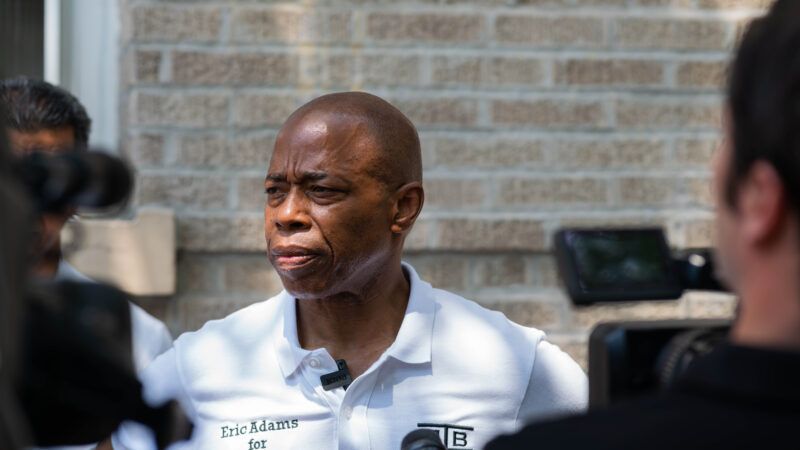NYC Mayoral Frontrunner Eric Adams Talks Conspiratorial Nonsense About 'Voter Suppression'
The ex-cop's closing pitch is filled with crazy accusations about "disenfranchis[ing] Black voters."

The final hours of hard-fought political campaigns are when politicians reveal much about themselves—and about what they think their electorates want to hear.
Then-President Donald Trump, in advance of a 2018 midterm that Republicans rightly feared might cost them their congressional majority, chose not to frame the votes as a referendum on the booming economy but as the "election of the caravan." Kamala Harris decided, in a way that foreshadowed administration policy, that two days before the 2020 election was the opportune time to make the case for "equity" as opposed to "equality."
So it's of particular concern, for both candidate and polity, that in the waning hours before Tuesday's ranked-choice vote New York Democratic mayoral frontrunner Eric Adams has been emphasizing the startling accusation that rivals Andrew Yang and Kathryn Garcia, by cross-promoting each other's candidacies, were engaged in politics resonant of Jim Crow.
"For them to come together like they are doing in the last three days," Adams, who is black, told The New York Times Saturday, "they're saying we can't trust a person of color to be the mayor of the City of New York when this city is overwhelmingly people of color."
Far from softening those Juneteenth allegations, Adams and his campaign have been sharpening them ever since, releasing an incendiary batch of surrogate conspiracy-mongering ("This is an attempt to bring the disgraceful national campaign of voter suppression to New York," "This is a cynical attempt by Garcia and Yang to disenfranchise Black voters," "[This] could be looked at as voter suppression through the ranked choice lens," etc.) and then digging in his heels during TV interviews Monday morning.
The Garcia/Yang collaboration "feeds into the signals of America," Adams charged on Fox. "We know America's dark past, everything from poll taxes to how we stopped the voting we've seen across the country. Many people felt this was symbolic of that."
Pressed by CNN's John Berman to disavow his surrogates' claims of voter suppression, Adams declined, saying: "I can say this: that African Americans are very clear on voter suppression, they know about a poll tax, we know about the fight that we've had historically, how you had to go through hurdles to vote. So if they feel based on their perception that is suppress-the-vote, than I respect their feelings, and it's not for me to determine their feelings."
Progressive candidate Maya Wiley, who is also black, smacked Adams back: "At a time when this country is seeing real voter suppression laws being enacted," Wiley declared in a statement, "using racism charges to undermine confidence in Ranked Choice Voting is cynical, self-interested and dangerous."
New York is no stranger to brawling ethnic politics (oftentimes literally), from the Irish takeover of Tammany Hall to the deadly Draft Riots of 1863 to the 1991 Crown Heights Riots and beyond. Race is frequently political subtext and often text. The desultory two terms of Mayor Bill de Blasio have been comparatively light on the open-ethnic-warfare front, though the recent apparent spike in anti-Asian violence has generated anxiety, as did conflicts last summer between the New York Police Departmen and Black Lives Matter protesters.
The type of racial politics most exemplified by de Blasio is precisely the style we can expect from Adams, who de Blasio has been reportedly backing in private. That is: disturbingly casual accusations of racism, to be tossed around when the politician is cornered and/or can't get his way.
When New York last Thursday published a critical examination of Adams' murky background and political connections, Adams called it "a despicable racist portrayal of a New Yorker that has fought on the behalf of New Yorkers of all ethnicities."
When reporters—and Andrew Yang—started knocking Adams for maintaining what might be a primary residence in New Jersey, the former cop and current Brooklyn borough president shot back: "You're old enough to remember Obama and Trump, running around saying Obama was not born in America….This is the same thing. This is how people demonize….How dare Andrew Yang say a retired captain, a state senator, a borough president, significant other is an educator, we can't have two homes?…He has two homes. You don't see the hint of racism in that? That I can't have two homes?"
Calling critics and rivals racist may not win earn Adams many accolades in the local press—the headline on today's New York Times coverage is "Adams baselessly insists his rivals are trying to suppress Black people's votes." But he's clearly calculating that it will help him woo sections of the black and Latino electorate who may otherwise lean Wiley. (The two candidates are as diametrically opposed on the signature issue of crime as any pairing in this campaign.)
In that same Times piece, Fordham political science associate professor Christina Greer suggests that there may be an audience for Adams' allegations.
"I don't understand the Adams critique, but he may be critiquing the visual of the Asian and white alliance and asking out loud to voters if this is the dog-whistle coalition we can expect under a Yang or Garcia administration," Greer told the paper, "meaning Blacks and Latinos will be excluded from debates on housing, pay equity and schools….Adams speaks in a frequency that Black people and some working-class white people can hear."
As Eugene Volokh has often noted, behavior that gets rewarded gets repeated. If after making and amplifying conspiratorial accusations about racism, Adams is rewarded with the mayorality of America's largest city, expect New York's always-fraught identity politics to become even more central to political life. What could possibly go wrong?


Show Comments (32)